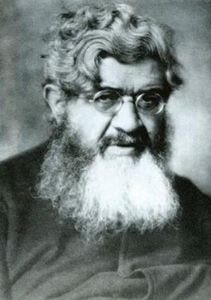Religious, Orator, Writer and Benefactor
 Father Giovanni Semeria was born in Coldirodi on 26 November 1867.
Father Giovanni Semeria was born in Coldirodi on 26 November 1867.
After his father's death, he moved to Turin with his mother where he attended the Collegio San Giovanni, the first Catholic institute in Turin.
In 1891 he entered the Royal College Carlo Alberto of Moncalieri, directed by the Barnabiti fathers and after entering this congregation on 15th April 1890 he was ordained priest.
He graduated in Literature at the Sapienza of Rome in 1893 and in 1897 in philosophy in Turin. During his years in Rome he dedicated himself to the apostolate and showed great interest in social problems.
He became famous as a great orator and always attracted the attention of a large public.
Among his admirers was also Queen Margherita. In 1903 he made a long journey to Siberia to understand the social life of those peoples and to dialogue with the Italians, who were involved in the construction of the Trans-Siberian Railway. He established relations with Leo Tolstoi. Later, in Vienna he met Eleonora Duse and when he returned to Italy he became friends with Fogazzaro, Pascoli and Edmondo De Amicis.
But Semeria's activity and thought soon became uncomfortable, he was accused of modernism and of professing unorthodox tendencies, so he was suspended from catechesis and teaching and sent to Belgium. In Brussels he began his apostolate and obtained teaching in primary schools.
In 1913 he made a long journey to the Holy Land. At the outbreak of the First World War, he returned to his homeland and at his request became, by order of General Cadorna, lieutenant of the Supreme Command of the Italian Army. During the three years of war he distinguished himself for heroic, edifying and tragic episodes ... It was precisely in this period that the decision to take care of the orphans that the war had procured matured.
After the war, his meeting with Don Minzoni led him to the creation of the Opera Nazionale del Mezzogiorno d'Italia, made possible by the alms of his fellow Americans and by the continuous and feverish quest that Father Semeria made everywhere. This colossal work, destined to assist the war orphans of the South and which reached 25 orphanages, 76 kindergartens, 5 mountain and marine colonies, a shelter for the elderly and two masterly women's schools, fully involved him and wore down his body until his death on 15th March 1931 in the province of Caserta.
Italy mourned him, humanity had lost one of the greatest religious of the century.
The Municipal Administration dedicated the road that connects Corso Guglielmo Marconi to Via Capo Nero to him.
(Source: Marco Mauro)




